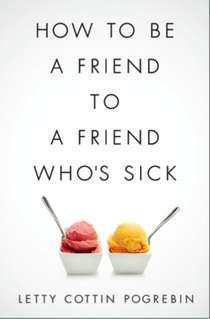How To Be A Friend To A Friend Who's Sick
This is an issue that we all want to talk about and that we could all use a little guidance around.

Thankfully there's a book for helping you know how to handle the situation and it's called How to Be a Friend to a Friend Who's Sick by Letty Cottin Pogrebin.

Q. When you were ill with breast cancer back in the fall of 2009 and early 2010, what did you most want from your friends?
A. I wanted them to really tune into my moods. Because I’m somebody who sometimes needs a lot of love and sometimes needs to be left alone. And the illness heightened those extremes. Being sick magnifies everyone’s essential characteristics.
Q. What kinds of responses were most helpful to you?
A. The people who asked, “Would it be good if I came over now, would you rather I don’t come over at all, or would you rather I come on Saturday?” And the people who said, “I’m going to bring you a present, so you might as well tell me what you want.” I learned through these interactions that you can be direct and candid — on both sides.
Q. What kinds of responses were most off-putting?
A. That everyday question, “How are you?,” with the portentous overlay of tragedy. You would say, “Fine.” And then they would say, “How are you, really?,” with a sort of sanctimony bordering on pity. In normal discourse it’s common to say, “How are you?” And we all say, “Great, fine.” But when a sick person is asked, “How are you?,” we have to calculate how much we’re going to tell and how much someone really wants to know. If it turns out someone is just going through the motions in asking, that leaves a really sour taste in your mouth.
Q. So, what’s a friend supposed to do?
A. Ask, “What are you feeling?” That will elicit a much more honest answer. Then the person who’s been sick can say, “I’m really depressed and tired of people asking me how I am, and I want to normalize my life.” That’s how I felt: I really didn’t want to revisit my diagnosis and the fear I’d felt.
Q. What about when someone’s died? That’s often awkward.
A. Tell the truth. Say something like, “I feel so sad for you.” And if you have a memory, give it. Tell how you’ll always remember how beautifully this woman’s husband played the cello or how his smile could light up the room, or how your friend’s mother had the most magnificent voice. Something that establishes that the person left a mark on your life and acknowledges the meaningfulness of the life that’s just ended.
For the complete interview, visit The New Old Age blog. And for our tips on how to express sympathy, see our article How to Express Sympathy: What to Say and What Not to Say.
Topics
Related Content
- How To Express Sympathy: What To Say And What...We’ve compiled a list of things to say—and things to avoid saying—when...Read more
- A Quick Overview Of Proper Funeral EtiquetteFunerals are emotionally complex, and knowing how to act can present a...Read more
- Paying Final Bills, Dues, And Estate ExpensesIn order to settle the estate, all outstanding bills and dues that the...Read more
- Funeral Pre-Planning Cheat SheetPlan now, rest later.Read more



